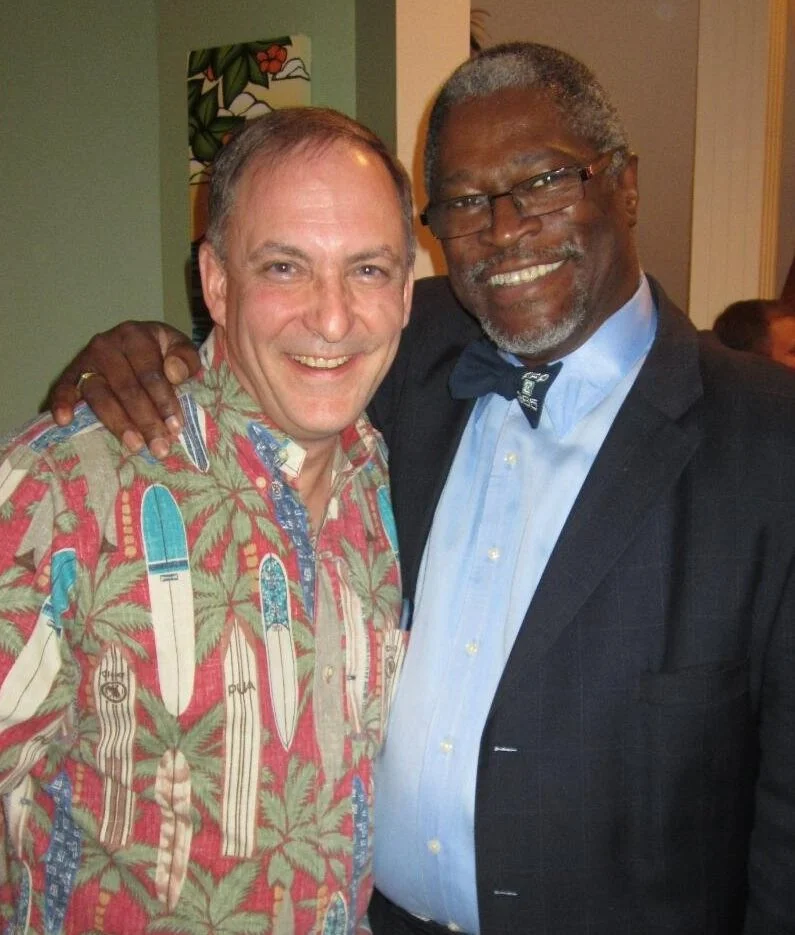Rimsie McConiga
Special to the Citizen
When Bob Bennett served as chief innovation officer under Kansas City mayor Sly James he was motivated by the mayor’s progressive vision.
“Mayor James was one of the first mayors to have a chief innovation officer, along with former New York City mayor Michael Bloomberg and former Chicago mayor Rahm Emanuel,” Bennett said. “He was a visionary.”
Now Bennett is using his experience to help cities embrace technology. He started B Squared Civic Solutions to help cities identify and implement ‘smart city’ solutions.
Bennett and James
He believes Americans need to be connected, and cities that prepare and develop policies and infrastructure to support that connectivity will attract talent and create new companies.
“Young graduates will go to these cities to seek their fortunes and cities that don’t implement these developments will get bypassed,” Bennett said.
In Parkville, preparing the community for a 21st century economy will begin with expanding Wi-Fi coverage into the parks as the impact of the recent flooding is mitigated.
“As that rebuild continues, we can take advantage of this time to install these new capabilities,” Bennett said. “This will give all the business owners along Main Street and throughout downtown their chance to say Parkville is a connected city so we can use additional connectivity and attract people to our businesses and our downtown to make our city that much more accessible to the digital economy. Connectivity benefits education, public safety, electricity, water and transportation.”
Bennett works with four cities, Parkville, Topeka, Kan., Racine, Wisc. and Aurora, Ill.
“The mayors of these cities, like mayor James, are looking a little more forward about how to use technology,” Bennett said. “If they were living in ancient Rome they would be the ones who said ‘you know those aqueducts, we need to get some here.’ The mayors I deal with are seeing that digital connectivity is equally transformative in the way people’s lives are maintained. Now my calendar is on my iPhone which is connected to my iPad which is connected to my iMac.”
The importance of up-to-date technological expertise is something Bennett believes is vital to keeping cities and towns in the loop in the digital age.
“Mayor James and I figured out how to bring public Wi-Fi along the streetcar line,” he said. “We figured out how to find better use of data and to influence how the city makes better decisions and becomes a better steward of the resources and how they use your taxes. I did a lot of planning for the Prospect Max expansion and how to include public Wi-Fi as part of that. The idea being if we can keep up physically with the bus line, we should also keep up digitally since in the 21st century that also is as critical as the physical.
“Mayor James was a lot of fun. He would give you what he wanted to be achieved, an objective, and then expected you to go do it.”
Bennett credits his 25 years in the Army for shaping his approach to collaboration, and said he became well-versed in technology as a learning curve necessity. When he was serving in northern Iraq he was selected as division level operational officer.
“When the Striker Brigade from Fort Lewis, Washington came in, they were the most technologically advanced brigade in military history,” Bennett said. “We had a tactical internet where vehicles could talk to vehicles with general messaging in 2003. We were running all over the desert doing this.”
During his tour he moved from the division staff down to the battalion level and had responsibility for an area about the size of Rhode Island.
“We were a little isolated from the rest of the population so we had to establish how we could provide drinking water for the populace,” he said. “We had to figure out how to police them, how to provide electrical power, how to do public safety like safety walls and check points. Because of the nature of our brigade we had mobile internet networks and high-tech water treatment plants.
“We had a lot of the elements that today are considered to be smart cities, but at that time for us it was just applying technology to solve our problems. We were dealing with catastrophes and trying to minimize it and humanize it.”
When he was stationed in Hawaii he was assigned to run Tomahawk missiles everywhere in the Pacific Theater and to do that he had to run 16 computer networks to make the system function.
“On one network there were people that gave us imagery, on another network there were people who were allies and I had classifications that were different on another network, plus unclassified networks to get news,” Bennett said. “I had to learn how to be a network administrator for all 16 networks.”
He was also responsible for all the operations in Africa at a point when no technology existed. All people in the area could use the networks simultaneously.
“Everyone had a different network, everyone had a different tool, Bennett said. “The State Department loved Mac products and the Department of Defense only used Microsoft. Everyone was using different programs and coordinating software was important.”
During his assignment in Hawaii Bennett gained a new appreciation for progressive thinking and how it benefits communities’ economic growth when he learned that King David Kalakaua pioneered the introduction of electricity there in 1888, five years earlier than the White House did.
“That’s why Hawaiian businesses were ahead of everyone else at the time,” Bennett said.
Bennett is happy to be part of the digital transformation of communities.
“When mayor James left office Kansas City had the smartest 54 blocks in all of North America, with 2.2 square miles along the streetcar line,” he said. “There is no place in North America that has connected digitally, connected physically and uses data to drive city services in that space. Nobody notices because it works.”


